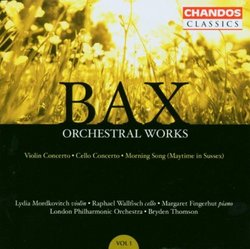| All Artists: Arnold Bax, Bryden Thomson, London Philharmonic Orchestra, Margaret Fingerhut Title: Bax: Orchestral Works, Vol. 1 Members Wishing: 0 Total Copies: 0 Label: Chandos Release Date: 10/21/2003 Genre: Classical Styles: Forms & Genres, Concertos, Instruments, Keyboard, Strings, Symphonies Number of Discs: 1 SwapaCD Credits: 1 UPC: 095115115428 |
Search - Arnold Bax, Bryden Thomson, London Philharmonic Orchestra :: Bax: Orchestral Works, Vol. 1
 | Arnold Bax, Bryden Thomson, London Philharmonic Orchestra Bax: Orchestral Works, Vol. 1 Genre: Classical
|
Larger Image |
CD Details |
CD ReviewsFirst Rate Concertos Joshua Grasso | Oxford, OH USA | 05/11/2004 (5 out of 5 stars) "Occasionally, you tell yourself that the relative neglect of an "obscure" composer is justified. After all, whenever I tell people that I'm listening to Bax, I get some rather puzzled stares. Yet don't give into temptation--Bax is an excellent composer who was capable of writing some first-rate music. This disc showcases two of his most powerful scores, with arguably more charm, panache, and argument than many of his symphonies. The Violin Concerto was written for Heifetz, who predictably refused to perform the work (I think he made a studio recording of it, but that was all). While it may lack the showmanship he was accustomed to, the work is still a brauvara affair, with an electric opening and very memorable themes. The slow movement is particularly memorable for Bax, and throughout attests to a very high degree of inspiration. The most charming movement is the finale, which has a kind of "La Valse" passage in the middle which is outrageous. A stunning work, beautifully played by Mordkovitch, who has single-handedly rescued so many unjustly neglected concertos and sonatas. My favorite piece, however, is the Cello Concerto--a genre I wouldn't immediately associate with Bax. It's a colossal work, full of motor rhythms, brooding Nordic elements, and exciting passages for cello. Some of Bax's most beautiful melodies adorn the first two movements, particularly the slow movement, which is a profound meditaiton upon...(fill in the blank). I honestly can't imagine a more committed score for cello and orchestra, and why this isn't occasionally performed instead of Elgar is baffling. I mean, come on, this is a GREAT work...but of course, I'm not speaking as a cellist, so I don't know. The disc concludes with a bit of Bax's lighter music, the Morning Song for piano and orchestra. It's a very charming, tuneful piece, and a refreshing aftertaste after the monumental virtuoso performances that preceeded it. All the pieces are amazingly performed by Bryden Thomson, whose recordings of Bax remain (for me) the standard. Everything "sounds here, and I couldn't imagine a better performance. A great disc, but it now and realize that Bax is a better composer than you realized--or remember why you got into him in the first place." A Remarkable Achievement From Chandos - Orchestral Bax - Par J. Rich | 10/20/2009 (4 out of 5 stars) "Bax "Orchestral Works, Volume 1" is apart of a nine disc series released by Chandos. All of these recordings are re-releases that were apart of Bryden Thomson's ongoing Bax symphony cycle. Some of the releases were just released as individual collections (i. e. "Tone Poems, Vol. 1,"). This is a very bold project for Chandos and they were the first to release Bax's orchestral works in a series such as this. Arnold Bax is such an underrated composer. He was very much apart of the English classical tradition, but what he did was forge a unique hybrid of Impressionism and Romanticism. I view much of Bax's output as almost like a fairy tale, because he manages to compose very otherwordly type of music. Bax was nine years older than Vaughan Williams and about 26 years younger than Edward Elgar to give you an idea of the time he grew up in. His music is truly remarkable and thanks to Chandos we all can enjoy these releases of this neglected composer.
"Orchestral Works, Volume 1" is the first installment of this fine series and is concerto recording. Here is the layout of the first volume: 1. Violin Concerto (1938) - Performed here by violinist Lydia Mordkovitch (Chandos go-to violinist it seems) and conducted by Bryden Thomson with the London Philharmonic. This is a great piece with hints of Elgar, Sibelius, Prokofiev, and perhaps even Shostakovich or Szymanowski. The overall structure of this concerto is three movements like most concertos. Mordkovitch does a great job and Thomson's conducting is right there with here every step of the way. 2. Cello Concerto (1932) - Performed here by cellist Rafael Wallfisch and conducted by Thomson with the London Philharmonic. Wallfisch who is a remarkable cellist whose repertoire is mostly rooted in early 20th Century classical and also obscure repertoire. 3. Morning Song (1946) - Performed here by pianist Margaret Fingerhut and conducted by Thomson with the London Philharmonic. This isn't a typical "piano concerto" by any stetch of the imagination. It's more of a orchestral work that happens to have a prominent piano part. Bax really didn't compose a "piano concerto" per se, but these pieces in a certain context could be mistaken for a concerto, but like Delius' concertos, they are much too rhapsodic to be considered concertos or at least in my opinion. Regardless of which, Fingerhut plays beautifully here and in recent months I've become quite impressed with her playing. There are eight more releases in this series after this concerto disc. If you're at all curious about one of England's greatest "unknown" composers, then try this first disc. 4 1/2 stars" |

 Track Listings (7) - Disc #1
Track Listings (7) - Disc #1